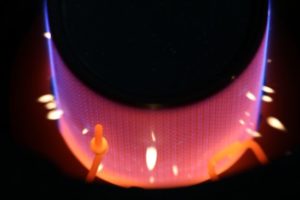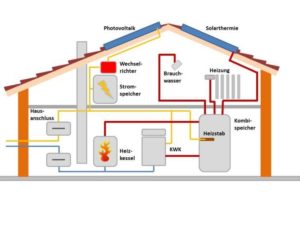Engineering on Heating Systems
Research and Development of Technical Solutions

Flame of a surface burner. Photo: OWI
Research and development in the field of heating technology is concerned with projects in the following fields of application:
- domestic heat and power supply (domestic heating) and
- mobile heating systems.
OWI researches and develops technical solutions for
- the optimisation of existing and investigation of new combustion technologies for liquid fuels
- the analysis of the characteristics of fossil and regenerative liquid fuels and their effects on technical components of heating systems
- the investigations relating to the resistance of materials (metals, plastics, insulation materials) to thermal influences and fuels with biogenic shares
…as well as software and calculation models for…
- the optimisation of the control and regulation of heating systems and
- the need-based design and combination of different technologies for energy supply with the aim of an efficient use of energy and low-emission operation.
Focus on the General View
In the development of heating technology, great strides have been made due to the requirements of climate and environmental protection. This relates to the increase of efficiency as well as to the reduction of the use of fossil energy carriers and the reduction of pollutant- and greenhouse gas emissions.

Various combinations of efficiency technologies are conceivable – but not all feasible combinations are practical. Illustration: OWI
Although low-temperature boilers prevail among existing oil burner installations, more efficient condensing boilers are constantly gaining market shares. Due to new standards in civil engineering with regard to insulation, the heat demand decreases, especially in the new building sector. At the moment, several different technologies which provide efficient and low-pollutant heating systems at low thermal power are being developed. This accounts, for instance, for the use of alternative heat sources, such as solar heat or heat pumps, in combination with liquid fuels. In this case, the combustion technology provides the necessary security of heating supply during unfavourable weather conditions.
High efficiency and low-pollutant emissions are aims that cannot only be achieved by the optimisation of technical components in heating systems, but also by heat demand-oriented system control and regulation. Intelligent software can help to use the new technology energy-efficiently and to find saving potentials.
The advantages and limits of individual systems show that a combination of different technologies can lead to an optimal design with regard to energy efficiency. OWI analyses demand profiles, e.g. of single- and apartment houses or even housing estates and developing areas. OWI is working on the creation of models by means of modelling and simulations that serve to develop combinations of heating systems, namely so called hybrid-heating-systems or multivalent systems. These systems can cover complex demand profiles optimally. Due to the analysis of primary energy saving potentials, the technology which is available on the market can be used optimally for heat and power generation by a combination of systems.
The combination of a condensing boiler with a solar heating system and a buffer represents one example. To attune these hybrid-heating-systems to necessary operation points with regard to high primary energy efficiency is also within the scope of system control and regulation. Ideally, the system automatically chooses the most appropriate energy carrier for the heat or power generation.
